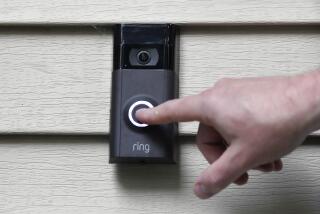IT -- the guys we love to hate
- Share via
THEY SAY OUR EYES are the window to our souls. But what about our hard drives? They’re the closest thing to a diary most of us will ever hope to keep, religiously updated with our private correspondence, our work and our fantasies. Yet we’re anything but intimate with the men and women tasked with keeping them healthy. Instead, our relationship with IT people is more like that of two armies staring at each other across a minefield.
The most dangerous anti-personnel issue of all is security. I was proud of my catchy password, until I discovered that it made me a thorn in the side of all IT-kind. It turns out my all-too-memorable byword is right up there in the “Ask Yahoo” list of no-nos, a virtual “Bring Your Own Hacker” cyberparty invite.
“Not everybody has the kind of mind that can fasten onto passwords,” says David Babski, chief IT guy for Energy Intelligence newsletters. To him, the only password worth knowing is 16 characters long and sprinkled with asterisks and whatnots and symbols I’d only use for cursing. Of course, his is un-crackable, even by one of those computer programs that attacks your password by trying every word in the dictionary, and then common and uncommon names. But would it still be secure if filed under P for “Passwords” in your electronic Rolodex -- or pasted to your monitor on a Post-It note?
“It’s not about intelligence but about memorizing sequences in abstract form,” Babski says. That’s nice for the IT Einsteins, but for the mnemonics-challenged majority (try saying that three times), those freakish passwords get filed under “Ain’t gonna happen.”
It’s classic co-dependency: We need IT people, but by the time they arrive, we’re not, um, at our best. Whose fingers have not euphorically glided over the keyboard, moments later to ball up into a fist, dangerously close to smashing that umpteenth “ ... encountered an error” window back into the Stone Age? Psychologists offer treatment for computer addiction, but what about computer rage?
Little wonder we can’t relate to the people who are supposed to keep our stress-inducing technology running. We rarely see each other face to face. We only dial when desperate, the professional equivalent of the booty call. And when we pick up the phone, emotions are raw. We’ve accessed that dark, snarling corner of the soul that defies the best therapists and yoga instructors and is only loosed when our computers freeze.
For some reason, many of us resort to craven flattery when in the company of an IT person -- until things go seriously wrong.
Robert Stiles, my IT friend with the wonderful title “solutions director,” is stunned when seemingly sane users go ballistic, “like we really wanted your machine to blow up, on purpose.” I ask him about that reptilian-brain panic we users often reach in the company of IT people. “You mean when you go back to infancy?” he asks. Hmmm.
Blame it on ADT -- attention deficit trait. The Harvard Business Review recently published “Overloaded Circuits: Why Smart People Underperform,” about this newly minted neurological malaise caused by technology and multitasking. Core symptoms include “inner frenzy and impatience” resulting in the classic office meltdown: “The brain and body are locked in a reverberating circuit while the frontal lobes lose their sophistication, as if vinegar were added to wine.” Add a computer malfunction and it’s obvious why there’s no IT-client socializing.
Yet change is afoot. The techie world is abuzz with a new plan to replace traditional software with “SaaS” or Software-as-a-Service. Instead of licensing and installing software packages, businesses can run applications via the Web. Ditto for maintenance. In the future, companies might have customer databases and word-processing programs all online, needing only the barest IT presence to monitor their hardware and Internet connections. Initially designed for small companies, the SaaS movement is creeping into bigger corporations anxious to slash the cost of their IT departments. Bill Gates has called SaaS the “next sea change.” The Yankee Group, a technology consulting firm, listed as a top reason for choosing SaaS in a recent poll: “To avoid the IT department.”
But this outsourcing deletes yet another human interaction from our already over-digitized and remote world. How will we know if we’ve got a hardware problem or a software problem? Who will we ask if our traditional IT department becomes a ghost town, replaced with chipper voices from Bangalore who haven’t heard of ADT yet?
The IT guys? My bet is we’ll miss them when they’re gone and wish we’d invited them out for drinks while we still had them in the building.






